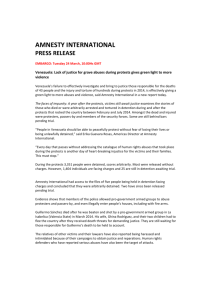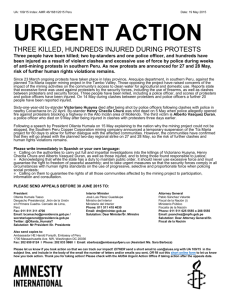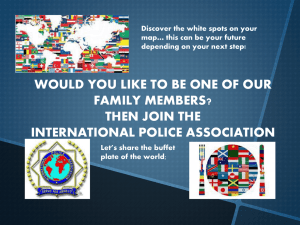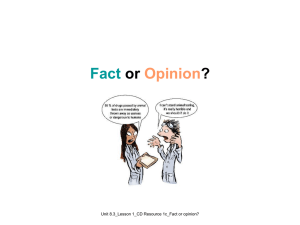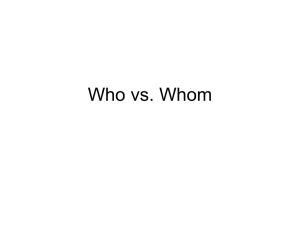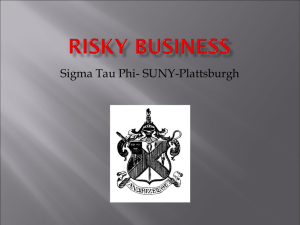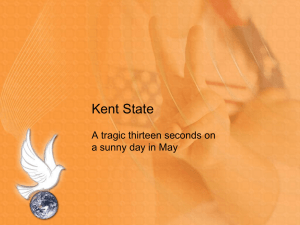In New York, where the occupation of Zuccotti Park in Lower
advertisement
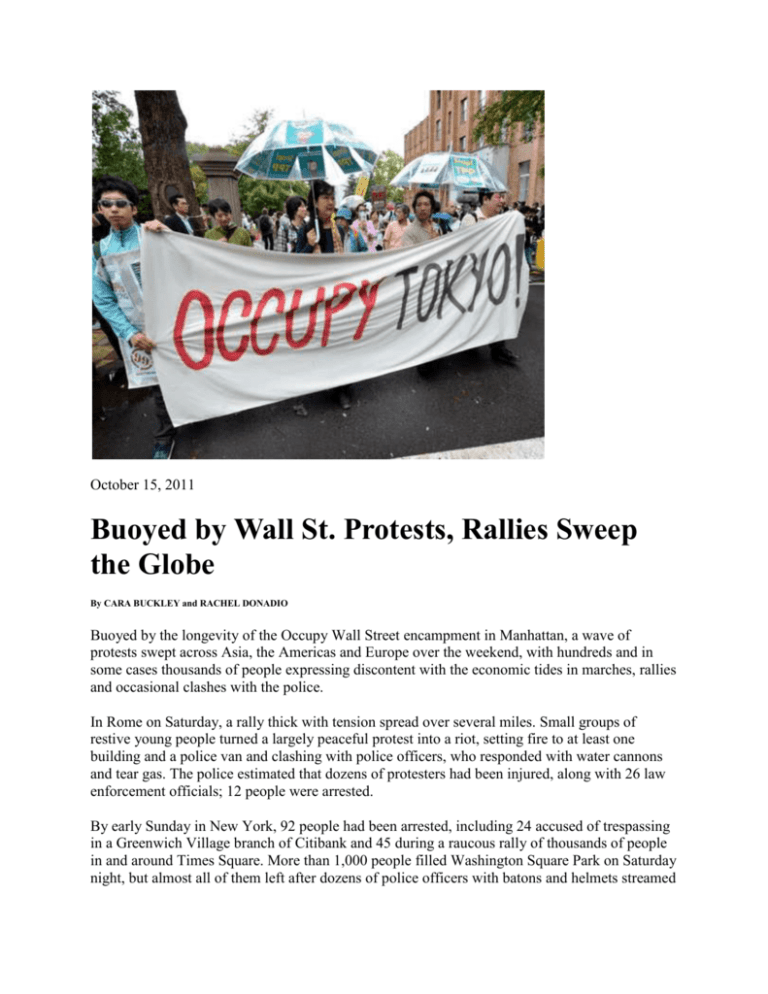
October 15, 2011 Buoyed by Wall St. Protests, Rallies Sweep the Globe By CARA BUCKLEY and RACHEL DONADIO Buoyed by the longevity of the Occupy Wall Street encampment in Manhattan, a wave of protests swept across Asia, the Americas and Europe over the weekend, with hundreds and in some cases thousands of people expressing discontent with the economic tides in marches, rallies and occasional clashes with the police. In Rome on Saturday, a rally thick with tension spread over several miles. Small groups of restive young people turned a largely peaceful protest into a riot, setting fire to at least one building and a police van and clashing with police officers, who responded with water cannons and tear gas. The police estimated that dozens of protesters had been injured, along with 26 law enforcement officials; 12 people were arrested. By early Sunday in New York, 92 people had been arrested, including 24 accused of trespassing in a Greenwich Village branch of Citibank and 45 during a raucous rally of thousands of people in and around Times Square. More than 1,000 people filled Washington Square Park on Saturday night, but almost all of them left after dozens of police officers with batons and helmets streamed through the arch and warned that they would be enforcing a midnight curfew. Fourteen were arrested for remaining in the park. Three police officers were injured dealing with a rambunctious crowd at 46th Street and 7th Avenue; they were treated at Bellevue Hospital Center and released. In Chicago, about 175 people were arrested at about 1 a.m. on Sunday after refusing to leave Grant Park before the 11 p.m. closing time, said Officer Laura Kubiak, a spokeswoman for the Chicago Police Department. Other than in Rome, the demonstrations across Europe were largely peaceful, with thousands of people marching past ancient monuments and gathering in front of capitalist symbols like the European Central Bank in Frankfurt. Similar scenes unfolded across cities on several continents, including in Sydney, Australia; Tokyo; Hong Kong; Toronto; and Los Angeles, where several thousand people marched to City Hall as passing drivers honked their support. But just as the rallies in New York have represented a variety of messages — signs have been held in opposition to President Obama yards away from signs in support of him — so did Saturday’s protests contain a grab bag of sentiments, opposing nuclear power, political corruption and the privatization of water. Yet despite the difference in language, landscape and scale, the protests were united in frustration with the widening gap between the rich and the poor. “I have no problem with capitalism,” Herbert Haberl, 51, said in Berlin. “But I find the way the financial system is functioning deeply unethical . We shouldn’t bail out the banks. We should bail out the people.” In New York, where the occupation of Zuccotti Park in Lower Manhattan was moving into its second month, a large crowd marched north early Saturday afternoon to Washington Square Park, where it was joined by several hundred college students who decried, among other things, student debt and unemployment. In late afternoon, the crowds marched up Avenue of the Americas toward a heavily barricaded Times Square, beseeching onlookers to join in with cries of “You are the 99 percent.” At Times Square, they convened with thousands of other protesters and caught hundreds of tourists unawares. “We thought they were going to stay down on Wall Street,” said Sandi Bernard — who is 59 and was visiting from Waldorf, Md. — while wondering if she would have trouble making the 8 p.m. curtain call for “Spider-Man: Turn Off the Dark.” Some tourists pumped their fists and whooped from atop double-decker sightseeing buses as the protesters cheered back. To keep 42nd Street clear the police shunted marchers up to 46th Street, where officers and the pressed-in masses had several run-ins. At one point the police pushed the barricades in toward the crowd, and the crowd pushed back. At another point two mounted officers moved their horses briefly into the throng. Three people were arrested trying to take down barricades, the police said. Later, as officers tried to disperse people east on 46th Street, 42 people who the police said defied their orders were taken away, in plastic handcuffs, in three police wagons. One witness, Harry Kaback, a 26-yearold comic selling tickets to the Ha! comedy club, said the protesters were “getting rowdy” with the police and shouting in their faces. For the protesters, marching on Times Square held almost as much significance as did protesting against Wall Street. “Times Square represents business as usual — buy, buy, buy in this economic climate, watch the latest show,” said Elias Holtz, 29, a Web designer who lives in Bushwick, Brooklyn. “But the crisis is everywhere.” The protest moved back to Washington Square Park, where people listened to speeches and debated whether to stay while police officers marched down Fifth Avenue and into the square. One officer gave a warning as midnight approached: “The park closes at 24:00 hours. You can exit to the east, west or south. You have 10 minutes.” Virtually everyone chose to leave, save 14 protesters who remained sitting in the dry bed of the park’s fountain and were arrested, the police said. Many headed back to Zuccotti Park, where there is no curfew. Earlier, about a dozen protesters entered a Chase branch in Lower Manhattan and withdrew their money from the bank while 300 other people circled the block, some shouting chants and beating on drums. The former Chase customers, who declined to reveal how much they had in their accounts — though a few acknowledged it was not much — said they planned to put their money into smaller banks or credit unions. “The more resources we give to small institutions, the more they’ll be able to provide conveniences like free A.T.M.’s and streamlined online banking so they can compete with the larger banks,” said Hannah Appel, 33, a postdoctoral fellow at Columbia University. Five people wearing masks were arrested during the march to Times Square for “loitering with masks,” said Paul J. Browne, the Police Department’s chief spokesman, an apparent reference to an old state law prohibiting masked gatherings (the law does not apply to masquerade parties). And two dozen people were arrested at a Citibank branch on LaGuardia Place on trespassing charges. Some witnesses said that the protesters had tried to leave but were locked inside by bank employees. “They were trying to leave, but they wouldn’t let them,” said Meaghan Linick, 23, of Greenpoint, Brooklyn. She said one woman who had been inside and left was forced back inside by police officers. Citibank, in a statement, said the protesters “were very disruptive and refused to leave after being repeatedly asked, causing our staff to call 911.” The statement continued, “The police asked the branch staff to close the branch until the protesters could be removed.” In Washington, several hundred people marched through downtown, beginning in the early morning, passing by several banks. Escorted by the police, the marchers also demonstrated in front of the White House and the Treasury Department before moving on to a rally on the National Mall, where they were joined by representatives of unions and other supporters. “You see how people are beholden to corporate interests no matter how hard you might have worked to get them elected,” said Kelly Mears, 24, a former software engineer. “There is a disconnect.” Saturday’s protests sprang not only from the Occupy Wall Street movement that began last month in New York, but also from demonstrations in Spain in May. This weekend, the global protest effort came as finance ministers and central bankers from the Group of 20 industrialized nations meet in Paris to discuss economic issues, including ways to tackle Europe’s sovereign debt crisis. Tens of thousands of protesters assembled in Madrid on Saturday evening, when chants mingled with live music, including a rendition of Beethoven’s “Ode to Joy,” lending the downtown area an upbeat feel on an unusually balmy fall afternoon. Brief clashes were reported in London, where the police were out in force with dozens of riot vans, canine units and hundreds of officers. But the gathering, attended by people of all ages, was largely peaceful, with a picnic atmosphere and people streaming in and out of a nearby Starbucks. The WikiLeaks founder, Julian Assange, made an appearance when a crowd assembled in front of St. Paul’s Cathedral. To loud cheers, Mr. Assange called the protest movement “the culmination of a dream.” In Rome, the protests Saturday were as much about the growing dissatisfaction with the government of Prime Minister Silvio Berlusconi, who narrowly survived a vote of confidence on Friday, as they were about global financial inequities. Tens of thousands of people turned out for what started as peaceful protests and then devolved into ugly violence. The windows of shops and banks were smashed, a police van was destroyed, and some Defense Ministry offices were set alight. “We don’t feel represented by the government. We feel made fun of,” Alessia Tridici, 18, said in Rome. “We’re upset because we don’t have prospects for the future. We’ll never see a pension. We’ll have to work until we die.” Cara Buckley reported from New York, and Rachel Donadio from Rome. Reporting was contributed by Jack Ewing from Frankfurt; Nicholas Kulish from Berlin; Joseph Goldstein, Elizabeth A. Harris, Colin Moynihan and Christopher Maag from New York; Catherine Garcia from Los Angeles; Raphael Minder from Madrid; Ron Nixon from Washington; and Ravi Somaiya from London. 6 Q’s About the News 1. WHERE is the Occupy Wall Street encampment? 2. WHERE did related protests occur over the weekend? 3. WHAT, according to the article, is the “grab bag of sentiments” expressed by the protesters? 4. WHAT is the topic that nevertheless has them “united in frustration”? 5. HOW long have protesters been occupying Zuccotti Park? 6. WHY did protesters march to New York’s Times Square on Saturday? 7. WHY did some of them say they are no longer customers of Chase? 8. WHY might European protesters have chosen this particular weekend to hold many demonstrations? 9. WHO is the European leader whose recently narrowly receiving a vote of confidence spurred some protesters to join the demonstrations? 10. WHEN did you first become aware of the Occupy Wall Street movement?


